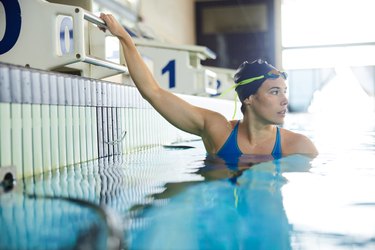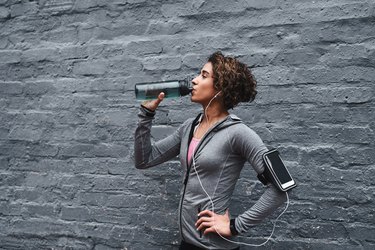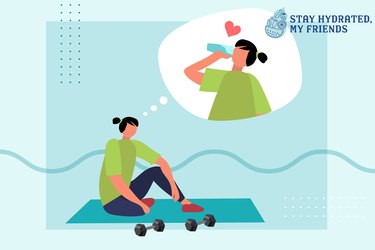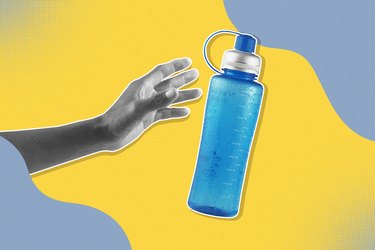
You're probably aware that sweat isn't the only indication of a good workout. However, it can be a signal that you need to keep hydrating. But do you sweat during your pool workouts, too?
Whether you swim laps, participate in a water aerobics class, or aqua jog, you are likely sweating while you swim, even if it doesn't feel like it. Here's how to tell when you're sweating while swimming, how to manage sweating while swimming, and tips for staying hydrated.
Video of the Day
Video of the Day
Do You Sweat While You Swim?
The short answer: Yes, you sweat while you swim.
"It's a common misconception that you don't need hydration when you are swimming because you don't feel yourself sweating," Marni Sumbal, RDN, exercise physiologist and triathlon coach says. "You may not feel sweaty because the water is cooling you down, but it doesn't mean you aren't sweating."
While recent studies exploring swimmers' sweat rates in the pool are few, a small September 2002 study in the Journal of Science and Medicine in Sport found that on average, the elite swimmers in the study lost about 6.8 fluid ounces of sweat for every mile they swam (that's almost a full cup per 20 minutes of swimming). But elites aren't the only swimmers who sweat in the pool.
"Because nearly everyone sweats while they swim, it is important to plan your hydration methods for before, during, and after your swim workout," Sumbal says.
Finding out how to tell when you're sweating while swimming and how to craft a hydration plan around this knowledge is key to having a healthy and successful swim workout.
How to Tell if You’re Sweating While Swimming
The average human body has a regular core temperature between 97°F and 99°F, according to the National Library of Medicine. When we begin doing strenuous activity, our core temperature starts to rise.
As you exercise, your body naturally attempts to cool itself down, and sweat is one way it does so. As you become warm, moisture is released through your skin in order to cool your body down, according to Harvard Health Publishing.
When you train on dry land, it's easy to tell when you're sweating. But when you're swimming, it can be difficult to see and feel when sweat forms on your skin. Nevertheless, there are a few signs that indicate you're sweating while swimming.
When you breathe heavily or feel winded during your swim, it's a sign that your heart rate is elevated and you're likely sweating, Sumbal says.
"Elevated body temperature is another sign. For example, if the pool felt cold or mildly warm when you first got in but now feels like bath water, it means your core temperature has warmed up and you are likely sweating while swimming, even if you can't feel it," she says.
Do You Sweat As Much in Water As on Land?
While sweat rates may vary between individuals, according to Sumbal, you probably sweat as much in water as you would on land but the pool may just be cooler than the outdoor temperature.
"Because the typical pool will have water temperature lower than the average human body temperature, the water has a cooling effect even as you work hard," Sumbal says. "But you are still sweating while you swim, as sweating is a normal response to working out regardless of being in the water or on land."
Why You Should Hydrate While Swimming
Even if you are currently able to complete your standard swim workout without any hydration, you could be leaving athletic benefits on the table by not taking in fluids during your training.
"A loss of fluid through sweating requires replenishment via drinking," Sumbal says. "Staying well-hydrated throughout a swim session may reduce the risk of cramping; blood is mostly made out of water and for optimal muscle functioning, proper hydration is key."
Another reason hydration is so crucial in the pool? Some may experience orthostatic hypotension after swimming, a form of low blood pressure that happens when standing up after sitting or laying down, per the Mayo Clinic. While this condition can be the result of numerous factors (and isn't super common), some may be related to dehydration, according to Sumbal.
Why is this possible when swimming? Because you move from a horizontal position while swimming to a vertical position when you stop and stand. Although it's not very common, for some people, that can trigger effects of orthostatic hypertension, including dizziness or lightheadedness.
"Signs that you may be struggling with your hydration during and after a swim workout may include: fatigue, dizziness, lightheadedness, difficulty focusing, nausea, and headache," Sumbal says.
And if you're not sure whether you're drinking enough while you swim, take a look at your urine after you exercise, Sumbal recommends. Your urine should be light yellow and if it's darker in color, you may be dehydrated.
Implementing a hydration plan before, during, and after your swim sessions can help you enjoy your swim workout more and reap more athletic benefits.
How to Hydrate Properly
While sipping water before, during, and after a swim workout is a good start, being specific about your swimming hydration plan is best.a
Drink a glass of water at least 20 minutes before your workout and keep a water bottle at the end of the pool, Sumbal suggests. You can even add an electrolyte powder or tablet to your bottle to make sure you're fully hydrated.
Take sips between intervals at least every 10 minutes. And after you're done with your workout, drink another glass of water within 10 to 20 minutes post workout.
Be sure to consult with your doctor or a licensed nutritionist to learn more about your specific hydration needs, especially if you plan on drastically increasing or decreasing the intensity of your swim workouts or other activities.
- The Mayo Clinic: Orthostatic hypotension (postural hypotension)
- Journal of Science and Medicine in Sport: "Body Mass Changes and Voluntary Fluid Intakes of Elite Level Water Polo Players and Swimmers"
- National Library of Medicine: "Body Temperature Norms"
- Harvard Health Publishing: "What Can I Do for my Excessive Sweating?"
Was this article helpful?
150 Characters Max
0/150
Thank you for sharing!
Thank you for your feedback!


